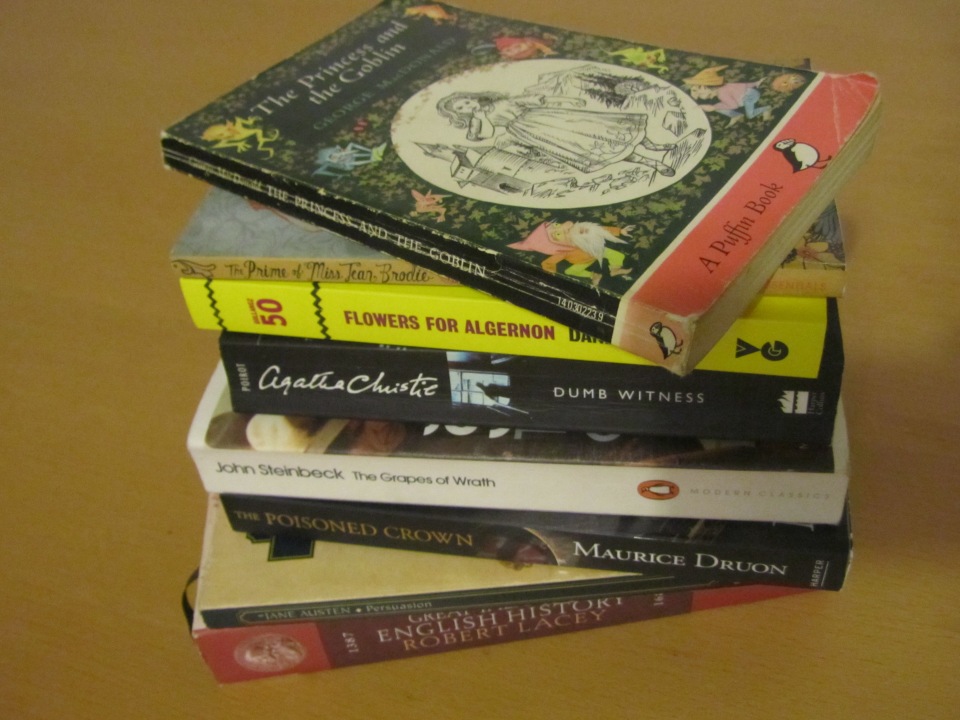
Some of the books I read in 2015
I was incredibly lax at blogging in 2015, posting only, er, one review. This wasn’t for lack of material: I read 86 books in 2015, which is an average of 1.65 (and some extra decimal places) a week. The reason I know this? I have been keeping a reading journal for the last 12 years.
‘Reading journal’ is a bit of a fancy name for a tatty ringbound notebook which simply lists the titles and authors of all the books I have read. It gives absolutely no indication as to what I thought of the books, other than the occasional enigmatic ‘NF’ in the sidelines (Not Finished; the reading equivalent of the race-runner’s dreaded ‘DNF’, Did Not Finish). Why do I keep this list, faithfully copying out long subtitles and racking my brains as to whether I read a particular book at the end of October or the beginning of November? What use is it to me, let alone anybody else? Quite honestly, I don’t know. But now I’ve started, I can’t stop. In the spirit of a new year purge I thought I’d share my list, along with my thoughts about reading habits and how to record them. So here goes…
January 2015
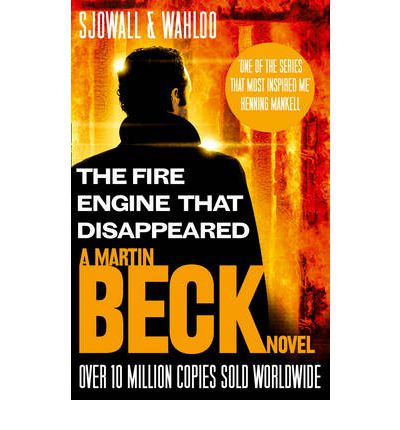
- Antonia Fraser – The weaker vessel: woman’s lot in seventeenth-century England
- Maurice Druon – The strangled queen
- Muriel Spark – The prime of Miss Jean Brodie
- David Suchet & Geoffrey Wansell – Poirot and me
- Agatha Christie – Murder on the Orient Express
- Maj Sjowall & Per Wahloo – The fire engine that disappeared
- Pamela Frankau – The winged horse
I like to think of myself as reading quite a wide range of books, but my reading journal shows my reading tastes are pretty narrow: mostly history, historical fiction, crime fiction and thrillers. January is a pretty representative month in this aspect. There’s nowhere to hide with a sternly factual record: I can’t kid myself that I’m more literary than I am.
February 2015
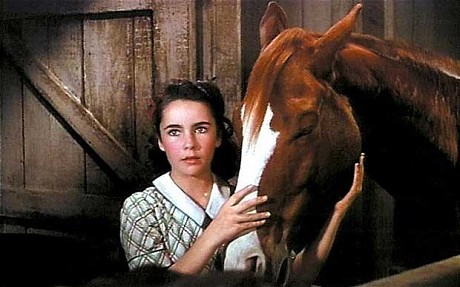
Elizabeth Taylor as Velvet in the film National Velvet
- Torie Jayne – Craft show and sell
- Robert Harris – An officer and a spy
- Enid Bagnold – National Velvet
- Maya Brenner – Beaded jewellery: create your own style
- Mike Revell – Stonebird
- John Steinbeck – The grapes of wrath
National Velvet was a re-reading of a book I loved as as kid (teenage girl disguises herself as a boy and rides a scruffy horse she won in a village raffle in the Grand National) and was relieved to find I loved it again. Stonebird is another children’s book, the debut novel from my friend Mike and is highly recommended for pre-teens.
March 2015
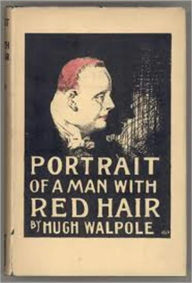
- Liane Moriarty – The hypnotist’s love story
- Jamie Coe – Art schooled
- Robert Lacey – Great tales from English history: Chaucer to the Glorious Revolution, 1387-1688
- Hugh Walpole – Portrait of a man with red hair
- Daniel Keyes – Flowers for Algernon
- Helen Fitzgerald – The cry
- Edna Healey – Emma Darwin: The inspirational wife of a genius
A couple of weird novels here. Flowers for Algernon is a sci-fi classic first published in 1966 in which the protagonist, a young man with an IQ of 68, is turned into a genius following a bioengineering experiment. But this ‘enhancement’ doesn’t make him happy, and when he slowly begins to lose his new-found intelligence things get even worse for him … Whereas it is the concept behind Flowers for Algernon that makes it unusual, Hugh Walpole’s Portrait of a man with red hair is weird because of its unsettling atmosphere. It’s an incredibly intense, sinister study of cruelty and manipulation. A member of the illustrious aristocratic Walpole family that includes both Robert Walpole (the first British prime minister) and Horace Walpole (author of Gothic classic The castle of Otranto), Hugh Walpole was a best-selling author in 1920s and 1930s who has since faded into obscurity. I bought a cheap secondhand copy of Portrait out of idle curiosity and will definitely be hunting out further Hugh Walpole novels in the future.
April 2015
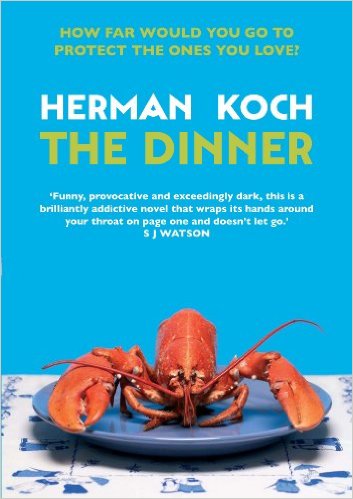
- Dashiell Hammett – The thin man
- Matt Fitzgerald – Iron war
- Herman Koch – The dinner
The dinner is an international bestseller by Dutch author Koch. Two sets of parents meet for dinner in a fashionable restaurant to discuss their teenage sons, who have carried out an act of appalling violence. What exactly the boys have done, and their parents’ reactions to it, are slowly revealed as they work their way through the multiple courses of their dinner. The contrast between the protagonists’ pretentious fussing over fine dining and their contemptuous disregard for the victim of their sons’ violence is supposed to reflect their moral bankruptcy, but for me The dinner doesn’t really work as any kind of wider social satire as the behaviour of its characters is so far beyond what anyone other than a psychopath would consider acceptable.
May 2015
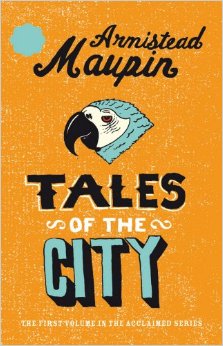
- Samantha Ellis: How to be a heroine, or, What I’ve learned from reading too much
- Sue Townsend – Adrian Mole: The cappuccino years
- Armistead Maupin – Tales of the city
- Charles Portis – True grit
- Brenda Fowler – Iceman: Uncovering the life and times of a prehistoric man found in an alpine glacier
I read some really good books this month, all courtesy of my local public library, which despite being a tiny one-room library in a small Norfolk town always has some intriguing gems. The cappuccino years is the fifth installment of the diaries of fictional Adrian Mole (first encountered as a 13¾-year-old struggling with puberty, the Falklands War, and the BBC’s obdurate refusal to broadcast his heartfelt poetry). Ever a humorous mirror of contemporary British social and political life, in this offering set in 1997 Mole is now 30 and a single father working as a celebrity chef, but he is still forlornly pursuing the beautiful, unobtainable Pandora Braithwaite, who has gained national fame as one of Blair’s babes. I loved (re)reading this, and am sad that there will be no more installments of the diaries following the death of Sue Townsend in 2014.
Tales of the city is the first of Maupin’s soap opera-style serialised novels set in San Francisco with a cast of colourful characters. I didn’t feel the fierce affection for the characters that many of its fans do, but found it refreshing and different to anything else I’ve read before (except perhaps the book of Sex and the city which is kind of a 90s New York version of Tales and is a lot darker and more complex than the TV adaptation).
Finally, I loved True grit, a thrilling Western/adventure story set in the 1870s and narrated by the unforgettable, god-fearing, firm-minded, quick-witted Mattie Ross:
“People do not give it credence that a fourteen-year-old girl could leave home and go off in the wintertime to avenge her father’s blood but it did not seem so strange then, although I will say it did not happen every day.”
June 2015
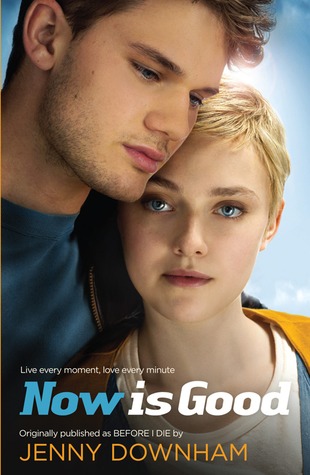
- Laura Andersen – The Boleyn king
- Charles Dowding – Organic gardening: The natural no-dig way
- Bob Flowerdew – Organic garden basics
- John Fedor – Grow your own organic fruit and vegetables: A complete guide
- Linda Gray – Herb gardening
- Kate Bradbury – The wildlife gardener: Creating a haven for birds, bees and butterflies
- Jenny Downham – Now is good
- Ben Macintyre – Agent Zig-Zag: the true wartime story of Eddie Chapman
- Dwayne Alexander Smith – Forty acres
- Agatha Christie – Dumb witness
- Masanobu Fukuoka – The one-straw revolution
- Henry Venmore-Rowland – The last Caesar (NF)
The epidemic of gardening books in June was due to my having just acquired an allotment. In between bouts of digging I found time to read Now is good (previously published as Before I die, it was retitled for release as a film – presumably because death is a bit of a downer and they didn’t want to put filmgoers off). It’s a young adult novel about a 16-year-old girl who is terminally ill with cancer and decides to do everything on her bucket list before she goes. This caused some controversy when the book was published as her wish-list includes sex and drugs. Brave and original, it unflinchingly faces all the aspects of death that most of us prefer not think about: debilitation, loss of consciousness, anger and depression, the effect of bereavement on loved ones, physical decomposition of the body after death. It’s also an uplifting celebration of life and all the things we should appreciate while we’re still alive. This was probably my book of the year.
July 2015
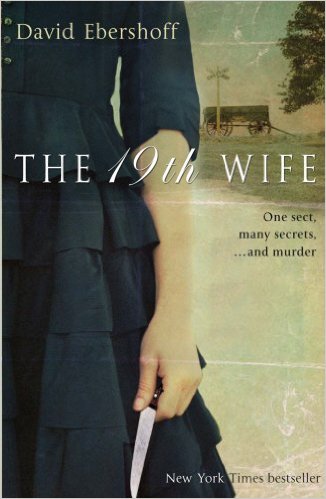
- David Ebershoff – The 19th wife
- George R. R. Martin – A game of thrones
In The 19th wife there are two ’19th’ wives, each the subject of separate plot threads. One is the real historical figure of Ann Eliza Young, the 19th wife of Mormon leader Brigham Young, who fled Salt Lake City in 1875 and spent the rest of her life campaigning for an end to polygamy. The other is the fictional BeckyLynn Scott, a modern polygamist wife whose boorish, bullying husband has been viciously murdered. All the evidence seems to point to BeckyLynn being the murderer and everyone – including the police and BeckyLynn’s own son – thinks it’s an open and shut case. But of course the situation is more complicated than it initially seems (how could a polygamist murder mystery not be?) Running two plot strands in parallel seems to be an increasingly common structure for novels, but in many cases it is an unneccessary distraction and I felt this was true of this novel: I found the Ann Eliza Young sections a bit boring and didn’t feel they added anything to the other story.
August 2015
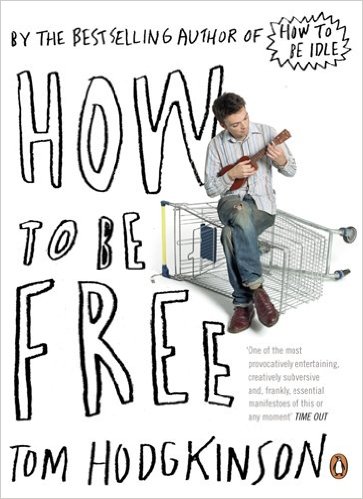
- Danny Wallace – Awkward situations for men
- Helen Fitzgerald – Bloody women
- Charles Dowding – Gardening myths and misconceptions
- Danny Dorling – So you think you know about Britain?
- Danny Wallace – Friends like these
- Prosper Mérimée – Carmen
- Tom Hodgkinson – How to be free
- Dave Hamilton – Grow your food for free (well, almost): Great money-saving ideas for your garden
- Maria Semple – Where’d you go, Bernadette
- Graeme Simsion – The Rosie project
- Philippe Claudel – Monsieur Linh and his child
- Sarah Stacey & Josephine Fairley – The green beauty bible
Tom Hodgkinson rails against modern life in How to be free, arguing that it is stressful, negative, lonely and above all joyless. It’s difficult to sum up his analysis and solution to this sorry state in a few lines, as his book ranges over several hundred years of literature, philosophy, religion and politics in search of alternative ways of living. Instead I’d recommend reading it yourself: you might not agree with all that he says, but it’s a refreshing and entertaining read – and possibly a liberating one too.
September 2015
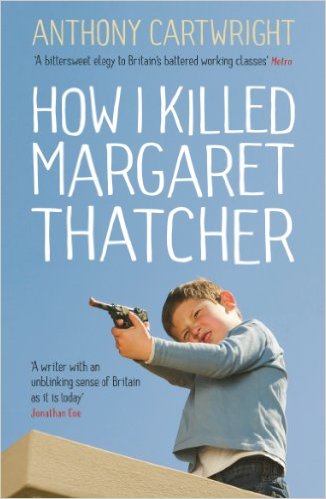
- Kimberley Cutter – The maid (NF)
- Janet Evanovich – One for the money
- Kirstie Clements – The Vogue factor
- Anonymous – I am the secret footballer: Lifting the lid on the beautiful game
- Phil Hogan – A pleasure and a calling
- Sloane Crosley – I was told there’s be cake: Essays
- Dick Francis – High Stakes
- Hal Herzog – Some we love, some we hate, some we eat
- Liane Moriarty – What Alice forgot
- Georges Simenon – The man who watched the trains go by
- Robert Ludlum – The Bourne identity (NF)
- Anthony Cartwright – How I killed Margaret Thatcher
Two out of three of the novels I started but didn’t finish in 2015 occurred in September. What was so bad about these three novels? In truth some of the books I finished were probably worse – I tend to hang on grimly with a book I’m not enjoying, in the hope it will have an ending so ingeniously brilliant and unexpected it will make up for all that went before. Somehow, for probably no rational reason, I just didn’t care enough about these three books to finish them. It’s an elusively slippery quality, the ability to make a reader care enough to carry on reading (and I realise that many people will have abandoned this post before this point, so if you’re still reading … thanks! It’s much appreciated. Not long to go now, I promise)
October 2015
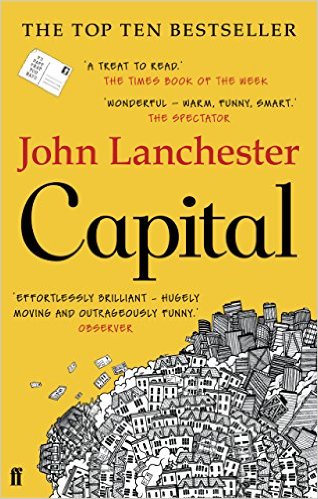
- Jen Campbell – Weird things customers say in bookshops
- Artruro Perez-Reverte – Captain Alatriste
- Helen Fitzgerald – The donor
- John Lanchester – Capital
- Pamela Horn – Labouring life in the Victorian countryside
- Eva Stachniak – The Winter Palace
- Robin Oakley – Tales from the turf: Reflections from a life in horseracing
The title of John Lanchester’s epic state-of-the-nation novel Capital is a pun: its subject is both London (capital city of England) and the vast amounts of money (capital) circulating through London’s streets. Most people’s wealth takes the form of house ownership, and Capital is brilliant at holding this national obsession up to scrutiny, examining the chain of events that are set in motion when the residents of Pepys Road receive anonymous postcards subscribed with “We want what you have”.
November 2015
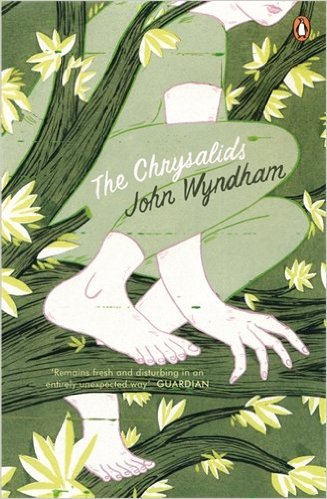
- Patricia Highsmith – Those who walk away
- John Le Carré – Call for the dead
- David Adam – The man who couldn’t stop: OCD and the true story of a life lost in thought
- Christopher Hibbert – The English: A social history 1066-1945 (selections)
- Philippa Gregory – The white queen
- John Wyndham – The chrysalids
- Adam Thorpe – Ulverton
- Marcel Theroux – Strange bodies
- Agatha Christie – The clocks
The level of geekery required to compulsively write down every book I read for no discernible practical benefit leads to serious problems. The most important being: what counts as a book? I don’t include newspapers or magazines, but what about anthologies where only some of the essays or short stories were read? What about reference books: how much of a book do I need to have read for it to have been read? This pointless agonizing can be seen in the entry in my reading journal above, where I’ve written the word ‘selections’ after The English: A social history 1066-1945 as a recognition of the fact that I didn’t read the whole book … merely the bits that were useful to me while researching a family history book I’m currently writing.
December 2015

- Maurice Druon – The poisoned crown
- Jane Austen – Persuasion
- John Mullan – What matters in Jane Austen? Twenty crucial puzzles solved
- George R. R. Martin – A clash of kings
- Ruby Ferguson – Jill’s pony trek
- George Macdonald – The princess and the goblin
- Matthew Green – London: A travel guide through time
I’ve read What matters in Jane Austen? before, and will no doubt read it a few times again. It’s a microscopic examination of 20 questions about Jane Austen’s novels, including ‘Do we ever see the lower classes?’ ‘What are the right and wrong ways to propose marriage?’ and ‘Why is it risky to go to the seaside?’ John Mullan credits Jane Austen with having put enough careful detail into her novels to reward the observant reader who pays attention to this minutiae. His own enthusiastic delvings unearth many intriguing facts, including the fact that in Emma nice-but-dim Miss Bates unwittingly reveals many of the secret intrigues going on behind the scenes in her unheeded loquacious ramblings: intrigues that have been completely missed by the intelligent, witty Emma herself. However, this is a book for diehard Austen fans who are familiar with all her novels rather than the casual reader, as it contains many plot spoilers.
So what are my new year’s resolutions for 2016? To blog more regularly is one of them, if only to avoid having to write a post as exhaustive as this one next year…
